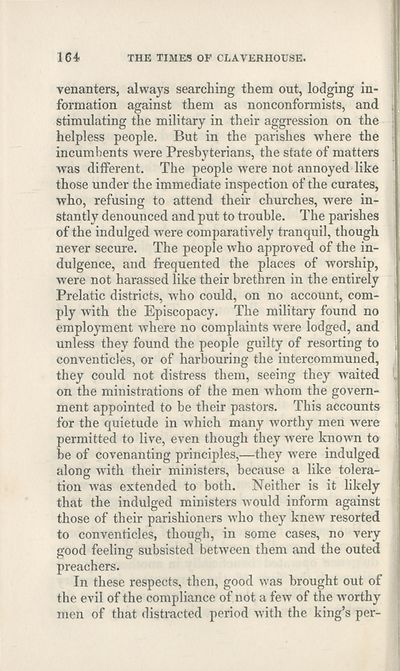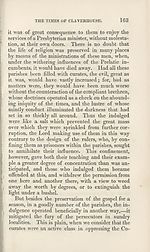Download files
Complete book:
Individual page:
Thumbnail gallery: Grid view | List view

164
THE TIMES OF CLAVERHOUSE.
venanters, always searching them out, lodging in¬
formation against them as nonconformists, and
stimulating the military in their aggression on the
helpless people. But in the parishes where the
incumbents were Presbyterians, the state of matters
was different. The people were not annoyed like
those under the immediate inspection of the curates,
who, refusing to attend their churches, were in¬
stantly denounced and put to trouble. The parishes
of the indulged were comparatively tranquil, though
never secure. The people who approved of the in¬
dulgence, and frequented the places of worship,
were not harassed like their brethren in the entirely
Prelatic districts, who could, on no account, com¬
ply with the Episcopacy. The military found no
employment where no complaints were lodged, and
unless they found the people guilty of resorting to
conventicles, or of harbouring the intercommuned,
they could not distress them, seeing they waited
on the ministrations of the men whom the govern¬
ment appointed to be their pastors. This accounts
for the quietude in which many worthy men were
permitted to live, even though they were known to
be of covenanting principles,—they were indulged
along with their ministers, because a like tolera¬
tion was extended to both. Neither is it likely
that the indulged ministers ivould inform against
those of their parishioners who they knew resorted
to conventicles, though, in some cases, no very
good feeling subsisted between them and the outed
preachers.
In these respects, then, good was brought out of
the evil of the compliance of not a few of the worthy
men of that distracted period with the king’s per-
THE TIMES OF CLAVERHOUSE.
venanters, always searching them out, lodging in¬
formation against them as nonconformists, and
stimulating the military in their aggression on the
helpless people. But in the parishes where the
incumbents were Presbyterians, the state of matters
was different. The people were not annoyed like
those under the immediate inspection of the curates,
who, refusing to attend their churches, were in¬
stantly denounced and put to trouble. The parishes
of the indulged were comparatively tranquil, though
never secure. The people who approved of the in¬
dulgence, and frequented the places of worship,
were not harassed like their brethren in the entirely
Prelatic districts, who could, on no account, com¬
ply with the Episcopacy. The military found no
employment where no complaints were lodged, and
unless they found the people guilty of resorting to
conventicles, or of harbouring the intercommuned,
they could not distress them, seeing they waited
on the ministrations of the men whom the govern¬
ment appointed to be their pastors. This accounts
for the quietude in which many worthy men were
permitted to live, even though they were known to
be of covenanting principles,—they were indulged
along with their ministers, because a like tolera¬
tion was extended to both. Neither is it likely
that the indulged ministers ivould inform against
those of their parishioners who they knew resorted
to conventicles, though, in some cases, no very
good feeling subsisted between them and the outed
preachers.
In these respects, then, good was brought out of
the evil of the compliance of not a few of the worthy
men of that distracted period with the king’s per-
Set display mode to:
![]() Universal Viewer |
Universal Viewer | ![]() Mirador |
Large image | Transcription
Mirador |
Large image | Transcription
| Antiquarian books of Scotland > Crime & punishment > Times of Claverhouse, or, Sketches of the persecution > (176) |
|---|
| Permanent URL | https://digital.nls.uk/135014087 |
|---|
| Description | Thousands of printed books from the Antiquarian Books of Scotland collection which dates from 1641 to the 1980s. The collection consists of 14,800 books which were published in Scotland or have a Scottish connection, e.g. through the author, printer or owner. Subjects covered include sport, education, diseases, adventure, occupations, Jacobites, politics and religion. Among the 29 languages represented are English, Gaelic, Italian, French, Russian and Swedish. |
|---|

